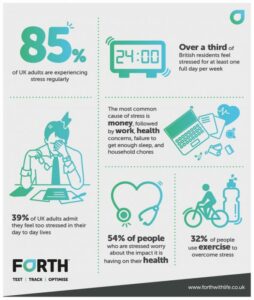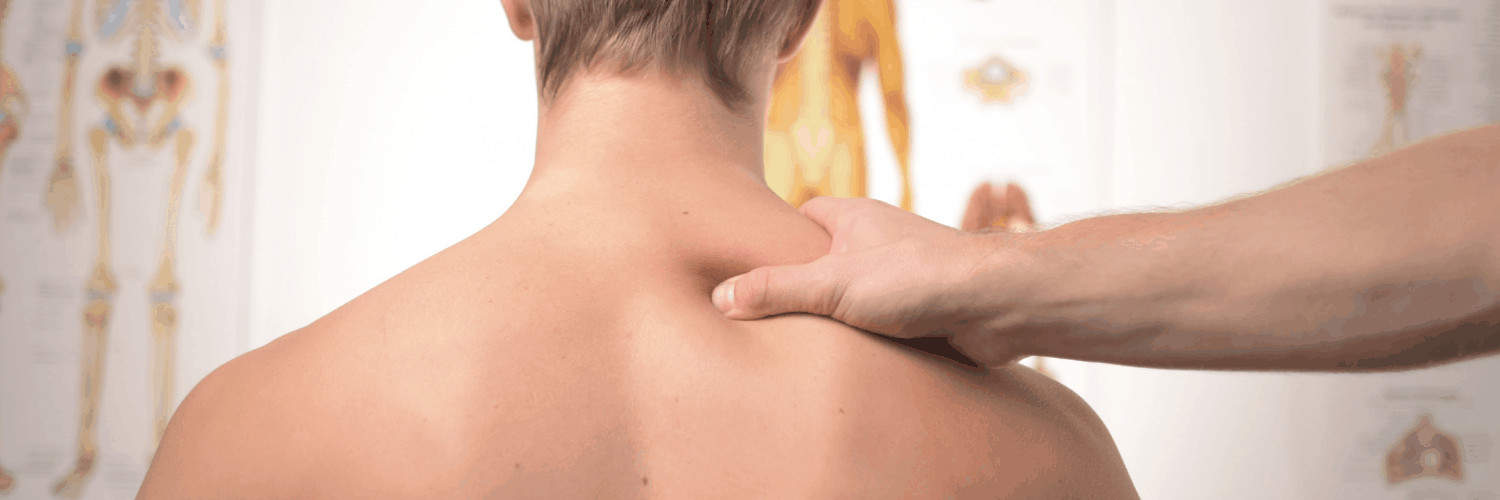Tag: Stress
Stress, everyone has it too some degree – some is healthy, lots is not.
What effect does a lot of stress have on your body?
Stress is known to affect the whole body but we shall focus on the way it affects the neck and shoulder girdle. Much research over the years has confirmed a connection between neck pain and stress. One study, for instance, in the BMC Musculoskeletal Disorders Journal, found that of nearly 500 people tested, those with stress, anxiety or depression had significantly worse neck pain that lasted longer than those without.
Even without the research though, lots of people will tell you that stress makes their neck and shoulders feel tight. When someone consciously relaxes, one of the most noticeable things to happen is their shoulders drop a couple of inches.
I’d go even further, and say that as the brain recognises the connection between stress and neck & shoulder tightness (and in fact initiates it). Let me explain, if someone has a tight neck or shoulders due to another cause, the brain, rightfully or wrongfully interprets this as the body being stressed.
If you have those muscles massaged and loosened and the neck releases, most people feel immediately less stressed.
Some of the many causes of neck or shoulder girdle dysfunction and stress crossover, such as long hours working at a computer to meet deadlines, and not sleeping very well. From this, secondary symptoms can develop, most commonly, headaches.
Some exercises that I recommend for tension headaches can be found here.
So what can we do about it?
Well, as always, firstly make sure there is nothing else causing your symptoms. Get a health professional to assess you and diagnose what is causing your symptoms.
If the diagnosis is stress or posture-related then get it treated. It’s important to treat from both a musculoskeletal point-of-view as well as understand and address the cause of your stress.
Alongside this, there are a number of at-home techniques you can do to help ease the tension in your neck and shoulders.
1. Do neck and shoulder mobility exercises.
A couple of quick and easy exercises I would recommend would be:
Exercise 1 :
https://www.youtube.com/shorts/vSBsfMnMx6M
Exercise 2 :
https://www.youtube.com/shorts/X6XJdciru0Q
Exercise 3 :
https://www.youtube.com/watch?v=A0HWan_RPwo
2. Get a good amount of quality sleep.
Stress is known to affect your ability to sleep. There are things you can do to give yourself the best chance of sleep.
– Make sure you’re comfortable in bed
– Be strict with no blue light (screens) for at least an hour before bed
– Having a warm bath or shower to help you relax
3. Find something to relax you.
It doesn’t have to be meditation or yoga, it could be exercise or playing an instrument. Perhaps avoiding instruments such as the violin which will exacerbate neck & shoulder pain. The ides if to find something that sends you to your flow state. Something that will distract you that you really enjoy and will relax you.
4. Work in a good environment.
Set up your workstation in an ergonomic way will do wonders for your posture. Remember to have lots of breaks and consider investing in a standing desk. If you’re interested in knowing what an ergonomic workstation set up looks like, continue reading here.
5. Speak to a healthcare professional.
Your health professional may recommend you get support or therapy for your stress, anxiety or depression, or any mental health issues you may be experiencing.
_____________________
Is Osteopathy the right path for you?
Osteopathy is a holistic way to diagnose and alleviate stress-related musculoskeletal problems including shoulder and neck pain and secondary symptoms such as headaches. The treatment is catered to the individual and Andrew will take all aspects of a patient’s lifestyle into consideration when suggesting a treatment plan.
All treatment starts with an initial consultation followed by any recommended follow up treatment. You can book your initial consultation with Andrew Doody online.
Mental Health Awareness Week: What Is Stress?
Look around your office, do you know if anyone is struggling?
You may think those around you – fellow colleagues or your staff – are completely fine. But mental health affects us all and problems in the workplace are actually very common.
According to mental health charity Mind, at least one in six workers are experiencing common mental health problems, including anxiety and depression.
Nowadays, there is increasing recognition of stress and mental health problems, both within the workplace and in everyday life. Currently, following Stress Awareness Month in April, we are approaching Mental Health Awareness Week, which takes place from 13-19th May.
We thought it might be helpful to focus on some positive strategies to help, in terms of stress management and resilience. Whilst being particularly useful and relevant within the workplace, these can all be used in everyday life as well.
WHAT IS STRESS?
In its purest form, stress is the body’s reaction to something it perceives as dangerous or threatening. When we feel under attack, our bodies respond by producing a mixture of hormones such as adrenaline and cortisol. These prepare us for physical action by diverting blood away from our core and into our limbs. It also temporarily shuts down some less vital bodily functions such as digestion.
For immediate, short-term situations, stress can be beneficial to your health, by helping you cope with potentially serious situations.
Yet if your stress response continues, and stress levels stay elevated far longer than necessary, it can take a toll on your health.
WHY IS IT IMPORTANT TO TACKLE STRESS?
Chronic stress can cause a variety of symptoms, contribute to many health problems (such as high blood pressure, heart disease, obesity and diabetes, anxiety and depression) and affect your overall well-being.
Reducing stress can help prevent these harmful effects on both mind and body.
Looking after yourself and ensuring you have good mental health has many benefits – not just for you as an individual, but for the business too. Employees are generally more productive, passionate and motivated when in good health. Even if they’re experiencing mental health problems, knowing they are supported by their employer can help in the recovery process.
STRESS PREVENTION IS BETTER THAN STRESS MANAGEMENT
Ultimately, the best way to manage stress is through prevention rather than cure.
Research shows that those who are better informed about the practical ways in which they can lower their stress levels are far better able to tackle difficult situations with emotional resilience and determination.
Within the workplace, employers are encouraged to make promoting the wellbeing of their employees a core element of the company’s internal operations. Some examples of a proactive approach to stress-management might be:
- To invite people to take active breaks away from their desks
- Offering lunchtime yoga classes or mindfulness sessions
- Group walks in the fresh air.
So what can help you reduce stress? Continue reading our stress, with Our Top Tips For Reducing Stress.
If you are interested in how Fleet Street Clinic can assist your workplace with stress management and resilience training, get in touch. Or if you are an individual who needs help with stress management, you can book a GP appointment online.
Feeling stressed?
Everyone feels stressed from time to time. In small doses, stress can actually be quite useful; motivating us to achieve our goals. But for some, stress is chronic. Meaning it is debilitating and negatively impacts their mood, their health and wellbeing, their relationships and their work.
Experiencing a lot of stress over a long period of time can also lead to a feeling of physical, mental and emotional exhaustion, often called burnout. It is, therefore, easy to see why reducing stress across all areas of your life would be important. Stress management tips are a good place to start.
Learning how to manage your stress takes practice and time.
Here are our top 10 ways on managing and reducing stress.
10 TIPS TO REDUCE STRESS:
-
Prioritise your health
– make decisions which will benefit your physical, mental and emotional wellbeing. For example, go alcohol-free a few nights each week or allow yourself time for a hobby you enjoy. These small steps for a healthier lifestyle will help in reducing stress levels.
-
Get a good night’s sleep (regularly)
– research clearly shows that sleep deprivation amplifies the symptoms associated with stress. Aim for between 7-9 hours of good quality sleep every night.
-
Practice deep breathing
– when our bodies are stressed, the muscles that help us breathe tighten. By focussing on taking several deep breaths we can quickly and effectively relieve physical symptoms associated with feeling stressed or anxious. Try to do this regularly throughout the day.
-
Drink enough water
– being dehydrated (however mild) causes our cortisol levels to rise, which automatically makes us feel stressed. Your body is already dehydrated if you’re feeling thirsty. So try to avoid reaching this point by hydrating yourself regularly. Aim for 2-3 litres per day, more in hot weather or when exercising.
-
Eat a balanced diet
– dieticians stress how certain foods have stress-relieving properties. For example, dark chocolate is rich in antioxidants, whilst avocados and oily fish are high in omega-3 fatty acids (both of which are proven to help lower anxiety levels).
-
Exercise regularly
– physical activity causes our brains to release mood-improving chemicals called endorphins. These help us to cope with potentially challenging situations. Both Public Health England and the World Health Organisation recommend at least 150 minutes of moderate intensity physical activity each week, in bouts of 10 minutes or more. Choose activities you enjoy to achieve maximum benefit for the mind as well as the body.
-
Adopt a positive mindset
– research suggests that making a conscious effort to think positively can help protect us against a whole host of physical and mental issues, including stress.
-
Manage your time and tasks effectively
– by giving ourselves enough time in which to complete a given task, and by making sure that we don’t try and accomplish too many stressful things at once, we can reduce the likelihood of feeling overwhelmed.
-
Spend less time online
– many studies have found a strong positive correlation between internet usage and stress levels. Spending less time on our computers and phones is a simple way to practice self-care. Having screen-free time for at least an hour before bedtime has also been shown to improve sleep.
-
Learn to say no
– in a culture that demands we take on more and more responsibilities, having the confidence to say “no” will only become more important. This final tip takes us back to the start, by reiterating the importance of prioritising our health above unrealistic social pressures, and brings us onto developing an essential tool – resilience.
Continue reading about Resilience or read What is Stress?
If you are interested in how Fleet Street Clinic can assist your workplace with stress management and resilience training, get in touch.
Or if you are an individual who needs help managing stress, you can book a GP appointment online. Our doctors will be able to talk through your thoughts, symptoms and emotions and set you on the right path to diagnosis. They will also be able to recommend relevant support services for stress, if appropriate.
Stress: Are we coping?
We all feel the effects of stress in daily life, whether it’s managing children or dealing with a problem at work. Stress is a normal response, in fact, in small doses, stress can be useful. The problems arise when you start to have a ‘fight or flight’ stress response to situations in everyday life. This can lead to illness, both mentally and physically.
The first step is to recognise symptoms of stress:
- Nail biting and fidgeting
- Over-eating or loss of appetite
- Irritability with other people
- Substance abuse, including alcohol and smoking
- Lack of concentration
- Increased and suppressed anger
- Feeling out of control
- Excessive emotion & crying
- Lack of interest in anything
- Permanently tired even after sleep
By identifying stress-related problems as early as possible, action can be taken to avoid any serious stress-related illness. For Mental Health Awareness week, which runs from 14-18 May, here are some tips to help manage your own personal stress:
- Be active – 30 minutes a day can reduce the emotions and let you take the time to think more clearly
- Take control – you are your own worst enemy, but you are also the key to empowerment!
- Find support – Connect with your family and friends, the more help the better the solutions
- Take time for yourself – remember to have time for yourself as well. Read, relax and get things done on your to do list that may be holding you back
- Create challenges for yourself – Setting achievable goals, little or big can help build confidence in your abilities
- Avoid unhealthy habits – Cut down on caffeine, smoking, and alcohol. These can enhance the feeling of stress in the long run
- Be positive – Instead of looking at problems negatively, try to see what you can get out of it to help you grow. Be grateful!
- Acceptance – Take ownership of mistakes, or acceptance of things you can’t control.
Our Occupational Health team at the Fleet Street Clinic are able to provide a full range of work health assessments to address the occupational health needs of your staff. Click here for more information.
To book an appointment with one of our friendly doctors, or for further details on what we can offer for our Occupational Health, call us today on 0207 353 5678 email info@fleetstreetclinic.com or book online now.

Everyone lives such busy lives, so much so that stress now seems an inevitable part of daily life. Whether it be work, personal relationships or even keeping up hectic social schedules, there is often very little time to truly relax.
When stress is chronic it will affect the body in many different ways, interfering with normal body functions such as digestion, blood flow, your pain threshold and also your ability to sleep. Your risk for depression and anxiety, heart attack and heart disease, obesity, eating disorders, and several gut problems also increases.
Tension across the shoulders, headaches, short temperedness, insomnia, tiredness, aches and pains, digestive disorders or menstrual problems are all made worse when the body is stressed and chronic stress can often be the root of unexplained infertility.
Common effects of chronic stress could include the following.
- Upset stomach, diarrhoea, nausea, constipation, heartburn, or other gut issues
- Rapid heart rate or chest pain
- Trouble sleeping
- Loss of sexual desire or reduced sexual function
- More colds or seasonal illness than usual
- Clenched jaw or teeth grinding
- Sore, tense muscles, especially in the neck and shoulders
- Constant worry
- Always seeing the “worst case scenario”
- Racing thoughts
- Feeling frazzled and unfocused
- Disorganisation and forgetfulness
Can you spot any of your mental or physical symptoms in the list?
So how does stress impact the body?
When subject to a stressor, adrenaline floods the body and primes the muscles and senses ready for action. Whilst this is useful to escape from danger, to meet that important deadline or to win the 100m race, when this ‘fight-flight’ stress response is constantly switched on, prolonged muscle tension and poor circulation eventually take its toll on the body. Often resulting in poor health, fatigue and ultimately adrenal exhaustion and collapse.
Our acupuncture specialist, Diane Timewell runs our acupuncture clinic in London. She takes a particular interest in the effects of chronic stress and how acupuncture can help with switching the body from this ‘fight- flight’ response into the parasympathetic ‘rest and digest’ side of the nervous system. Acupuncture can help with controlling stress and anxiety, as it affects the part of your brain that regulates emotions, reducing stress naturally.
Medical acupuncture stimulates acupoints of the body to promote the release of ‘happy hormones’ such as endorphins. This reminds the body to relax, let go of daily stress and signals that you are safe and secure so the stress response can be turned off. In doing so, proper circulation is restored allowing our internal organs to work as they should unhindered by tension. This produces a vibrancy and vitality that can be felt both physically and mentally.
When it comes to acupuncture treatment for stress, there is no one-size-fits-all approach. Whilst there are many points that consistently improve stress, when acupuncture is used to treat stress, the treatment will be fully bespoke.
Stress affects everyone’s body individually and so Diane will work with you to pinpoint all your personal imbalances, treating your whole body based on your particular symptoms and pain areas.
You don’t need to feel unwell to benefit from acupuncture medicine. High achievers, Type A personalities, those who want to climb every mountain are very often sympathetic-dominant adrenal types. Adrenaline is the motivator of the body and so to some extent all successful people will benefit from a certain amount of stress. Learning how to switch it off after the target has been achieved is the key.
Acupuncture treatment is an essential tool for both physical and mental well-being. It can be an excellent way to learn how to take control of your health and switch off chronic stress.
At Diane’s acupuncture clinic, she creates a safe and peaceful environment where you can de-stress, reenergize and regain your natural well-being and vitality.
You can book an acupuncture appointment with Diane online.
The health of both our planet and its people is, without doubt, one of the most important issues of our time. Maintaining healthy wellbeing has been in the public eye for some time now, particularly the topic of how to achieve good mental health. Chinese medical thought and acupuncture treatment can help us understand what we can do to help ourselves to achieve and maintain good health. Its teachings encourage us to inhabit our body, to connect to and to nourish our physical self and the physical world around us. This physical basis provides the root of our mental and emotional well-being.
A holistic treatment
Where Western Scientific Medicine has gone down the microscope to discover the minutiae workings of the human body (cells, biochemicals, genes), the understandings of Chinese Medicine, developed over thousands of years, have focused on how the body systems work together. It observes a person in their environment, their lifestyle, their posture… to understand the causes of ill-health, and the symptoms that arise to alert us to this. The whole body-mind is considered, and treated, to bring us back to good health and well-being.
A leap of faith for our Western minds
Acupuncture is a leap of faith for our Western minds. The concepts on which it is based do not exist in Western thought. You can’t cut open the body and find the meridians which form the energetic framework of the human body, or the Qi (pronounced ‘chee’, meaning energy) which flows through this network to motivate our physiological processes. Similarly, you can’t cut open a light bulb and find electricity. Likewise, you cannot cut open a computer and find cyberspace. It doesn’t mean that these things don’t exist. Proof of their existence lies in their application and the same is true of acupuncture treatment. Only through experiencing acupuncture for yourself will you be able to judge its true value.
Acupuncture helps reduce stress
Acupuncture is often described as incredibly relaxing, regardless of what a person seeks treatment for. Furthermore, most patients report an improvement in energy levels, sleep and a feeling of general well-being.
Acupuncture helps calm the nervous system. As a result, it helps switch off the ‘Fight-Flight’ stress response. Fuelled by adrenaline to keep us alert and primed for action, the stress response helps us to achieve. It is a useful tool for success. If the stress reaction is prolonged and not switched off, problems start to arise.
Heart rate increases, breathing quickens, muscles tighten, blood pressure rises .. it is perhaps not surprising that stress-related ailments are estimated to account for 75-90% of all doctor’s visits. By calming the body and promoting parasympathetic activity, Acupuncture helps improve circulation and reduce general muscle tension. This enhances all body functions not concerned with immediate survival – immunity, digestion, fertility, rest, recovery, repair. Generally speaking, the results note an overall feeling of relaxation and well-being.
Acupuncture helps manage day-to-day ailments
Our Acupuncturist, Diane, has 25 years experience in Chinese Medicine. She treats a wide variety of day-to-day ailments. Including headaches, IBS, anxiety, infertility. As well as the musculoskeletal pain, which acupuncture is most famous for. Why not book an appointment today to see how acupuncture can help you improve your health and well-being?
If you think you could benefit from acupuncture, you can book your appointment online.
By Diane Timewell | Acupuncturist | July 2019
Approximately 1 in 4 people in the UK will experience a Mental Health problem.
Unfortunately, how we cope with mental health problems, in general, seems to be getting worse.
Leading to an increased number of self-harm and suicide victims. Spotting early warning signs in the workplace and helping those who may be experiencing workplace problems is an extremely important part in reducing the number of deaths by mental ill health each year.
Stress, anxiety and depression are the biggest cause of sickness absence in our society. At Fleet Street Clinic, we believe in creating safe, healthy workplaces where mental health and physical health of employees are valued equally. Therefore, we believe that investing in mental health first aid training, much like physical first aid training should be part of everyone’s corporate wellbeing strategy.
The Fleet Street Clinic will be running a two-day Mental Health First Aid course delivered by Leigh Mckay. This course is designed for all employees, line managers, HR professionals, OH workers and senior leaders alike who wish to become a qualified mental health first aider. By training your staff you’ll be joining a global movement of over 3 million trained Mental Health First Aiders across 25 countries.
Leigh is a quality assured MHFA instructor accredited by the Royal Society of Public Health. She has a particular interest in psychology and emotional resilience. Leigh has a wealth of experience in delivering the MHFA courses in corporate companies. Plus, she advocates that a workplace and community that promotes wellbeing can have a positive impact on everyone’s physical, mental and emotional health.
What is Mental Health First Aid?
Mental Health First Aid (MHFA) is an Internationally-recognised training course. It teaches people how to spot the signs and symptoms of mental ill health. MHFA won’t teach you to be a therapist, however, just like physical first aid training, it will teach you to listen, reassure and respond, even in a crisis.
A quality assured instructor will deliver the adult MHFA courses, which are for everyone aged 16 upwards. All instructors attend an Instructor Training programme accredited by the Royal Society for Public Health. Therefore, they are specifically trained to keep people safe and supported whilst they study this course.
What will I learn?
Learning will take place through a mix of group activities, presentations and discussions. Throughout the course, you will gain practical skills and awareness about mental health.
This includes:
- A deeper understanding of mental health and the factors that can affect people’s wellbeing, including your own
- Practical skills to spot the triggers and signs of mental health issues
- Confidence to step in, reassure and support a person in distress
- Enhanced interpersonal skills such as non-judgemental listening
- Knowledge to help someone recover their health by guiding them to appropriate support
How will attending an MHFA course help?
There are many benefits to taking part in an MHFA course. Firstly, research and evaluation have shown this course raises awareness of mental health literacy. The more understanding and knowledge about mental disorders lead to better recognition, management and prevention. Secondly, this reduces the stigma attached to ill mental health, especially in the workplace. Further, this course champions its students to increase their confidence in handling mental health issues. But, most importantly, it promotes early intervention. Above all, becoming a Mental Health First Aider can enable the recovery of a sufferer and even save lives.
Course Details:
Date: Thursday 26th & Friday 27th September, 2019
Location: 29 Fleet Street, London, EC4Y 1AA
Cost: £350 per person
Spaces are limited.
To book yourself and/or a colleague on to the Mental Health First Aid course, please email to our Corporate Manager, Caroline McKenzie here.






